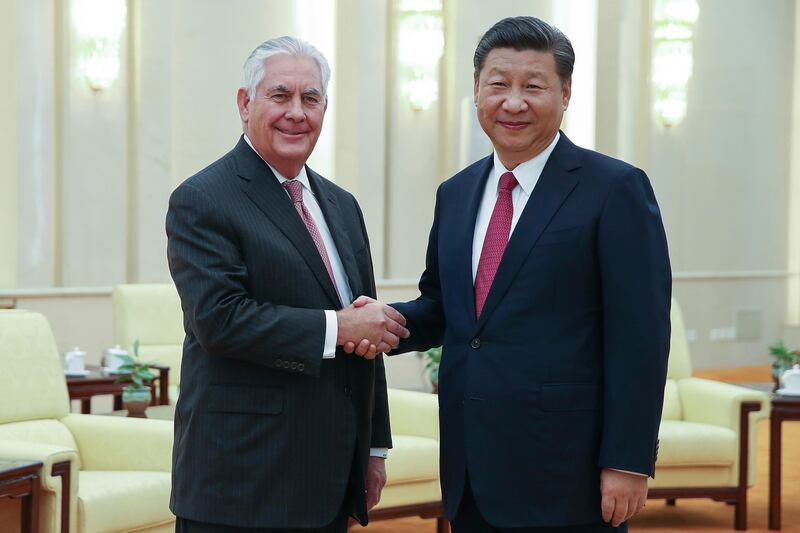President Donald Trump said on Sunday he had told the US secretary of state not to waste his time trying to negotiate with North Korean leader Kim Jong Un.
"I told Rex Tillerson, our wonderful Secretary of State, that he is wasting his time trying to negotiate with Little Rocket Man," Mr Trump wrote on Twitter, using his sarcastic nickname for Mr Kim.
"Save your energy Rex, we'll do what has to be done!" he added.
Mr Trump's comments came a day after Mr Tillerson disclosed that the United States was directly communicating with North Korea on its nuclear and missile programmes — even as the state department said Pyongyang had shown little interest in dialogue.
During a trip to China on Saturday, Mr Tillerson said the US was probing North Korea to see whether it was interested in dialogue and that it had multiple direct channels of communication with Pyongyang.
It was the first time the Trump administration had acknowledged it was in direct communication with the North.
The disclosure came as Mr Tillerson expressed hope for reducing tensions with North Korea, which is fast advancing toward its goal of developing a nuclear-tipped missile capable of hitting the US mainland. The country conducted its sixth and largest nuclear test on September 3 and has threatened to test a hydrogen bomb over the Pacific.
"We are probing, so stay tuned," Mr Tillerson told a small group of reporters in China. "We ask: 'Would you like to talk?'"
He said the US had "a couple of, three channels open to Pyongyang".
Mr Trump has vacillated between direct personal attacks on the North Korean leader and a willingness to negotiate. After announcing new US sanctions last month on North Korea, he also acknowledged diplomacy was still possible, asking: "Why not?"
Mr Tillerson said on Saturday that the goal of any initial dialogue would be simple: finding out directly from North Korea what it wants to discuss.
But, he added: "We haven't even got that far yet."
Trying to tamp down expectations, the state department said later there were no signs Pyongyang was interested in talks.
"North Korean officials have shown no indication that they are interested in or are ready for talks regarding denuclearisation," department spokeswoman Heather Nauert said.
_______________
Read more:
Trump to embark on tour of Asian countries in November
Security experts examine implications of a North Korea conflict
_______________
Mr Tillerson had previously offered little detail about US outreach. On September 20, he acknowledged only "very, very limited" contact with Pyongyang's UN envoy.
When asked about Mr Tillerson's assertion and what communication there might be between Pyongyang and Washington, a spokesman for the North Korean mission to the United Nations said, "[I] can't go further into detail".
The US secretary of state's remarks followed a day of meetings in Beijing, which has been alarmed by recent exchanges of warlike threats and personal insults between Mr Kim and Mr Trump.
US officials, including Mr Tillerson, say Beijing - after long accounting for some 90 per cent of North Korea's foreign trade — appears increasingly willing to cut ties to its neighbour's economy by adopting UN sanctions.
Mr Tillerson said China's more assertive posture was due to its realisation that North Korea's nuclear and missile capabilities had advanced too far.
"I think they also have a sense that we're beginning to run out of time and that we really have to change the dynamic," Mr Tillerson said.
The goal of the sanctions would be getting Mr Kim to view nuclear weapons as a liability, not a strength.
Still, the US intelligence community does not believe Mr Kim is likely to give up his weapons programme willingly, regardless of sanctions.
"[Tillerson] is working against the unified view of our intelligence agencies, which say there's no amount of pressure that can be put on them to stop," Senator Bob Corker told a hearing at the chamber on Thursday.
Mr Kim sees nuclear-tipped intercontinental ballistic missiles as "his ticket to survival", Mr Corker said.
Mr Tillerson agreed that Mr Kim's nuclear and missile programmes were aimed at ensuring his own security, and renewed assurances that the US did not seek to topple Mr Kim's government.
"Look, our objective is denuclearisation [of North Korea]," he said. "Our objective is not to get rid of you. Our objective is not to collapse your regime."
It is unclear how and when any actual negotiations with Pyongyang might be possible.
White House national security adviser HR McMaster said on Monday there were no set preconditions for talks. He added, however, that Pyongyang's capabilities were too far advanced to simply freeze its programme in return for concessions.
He also dismissed the idea of negotiating with Pyongyang even as it continued to develop its nuclear weapons programme.
Mr Tillerson in March suggested the United States would only engage North Korea in negotiations once it gave up nuclear weapons.
But he acknowledged on Saturday that denuclearisation would be an "incremental process".
"You'd be foolish to think you’re going to sit down and say: OK, done. Nuclear weapons, gone. This is going to be a process of engagement with North Korea," he said.





